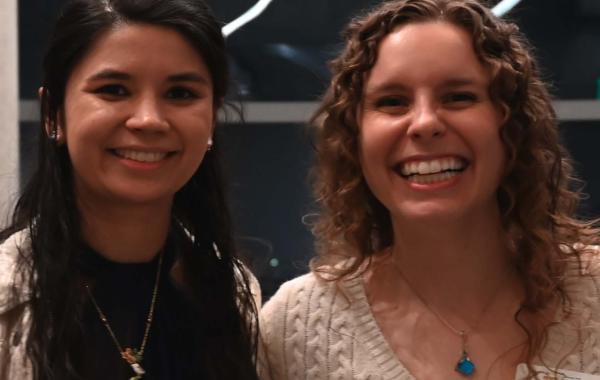QBioS Graduate Students Awarded JS Weitz Excellency in Travel Funds for Conferences Worldwide

Ellen Liu and Cassie Shafer
The Quantitative Biosciences (QBioS) PhD program has awarded travel funding to nine graduate students through the JS Weitz Excellency in Travel Fund, supporting their participation in prestigious conferences and research collaborations spanning four continents. The awards enable students to present their research, build professional networks, and engage with leaders in their respective fields.
Jin Zhu will travel to Houston, Texas in November 2025 to present both an oral talk and poster at the 78th Annual Meeting of the APS Division of Fluid Dynamics. The conference provides an important opportunity for Zhu to share research findings and receive feedback from experts in the field. Similarly, Sana Aminnaji will present a poster at the Society for Neuroscience conference in San Diego this November, showcasing work on temporal expectation signals during adaptive motor timing behavior in the cerebellum. Alfie Brownless was awarded funding to attend the Computational Medicinal Chemistry School in Cambridge, US this September.
International travel awards will support several students attending conferences abroad. Ellen Liu received funding to present at IROS 2025, the IEEE/RSJ International Conference on Intelligent Robots and Systems, in Hangzhou, China this October. Liu is first co-author on a robotics paper developed in collaboration with researchers from Thailand and Denmark. Sidharth Srinivasan will travel to Cambridge, UK in spring 2026 for the Student Conference on Conservation Science, where he will present a poster on long-term changes in bird densities across land use gradients in the high-altitude Himalaya.
Two students from the Goldman lab will attend the Society for Integrative and Comparative Biology annual meeting. Zhaochen Xu will present work on resistive force theory modeling of centipede locomotion at the water-air interface, research that bridges robophysics and integrative biology. Jianfeng Lin will present collaborative work with Professor Henry Astley from the University of Akron on axial muscle multiarticularity in the sandfish lizard, investigating how multiarticular muscles contribute to torque balance and energy distribution during sand swimming. The conference takes place in Portland, Oregon in January 2026.
Brendan Shrader received funding to attend the Joint Mathematics Meetings 2026 in Washington, DC, where he will deliver a talk on quantifying the impact of partial immunity on disease endemicity. The work discusses a recently submitted manuscript that introduces the concept of a reinfection reproduction number to better characterize disease persistence in recovered populations.
The fund also supports research collaborations beyond traditional conferences. Sayantan Datta will travel to the University of Geneva to work in the Dudin Laboratory, establishing protocols for ultrastructure expansion microscopy specifically optimized for snowflake yeast from the Multicellularity Long-Term Evolution Experiment. The month-long research visit will enable visualization of cellular ultrastructure within complex multicellular clusters, addressing questions about the spatial organization of evolved cell types that cannot be answered with current microscopy approaches.
The diversity of conferences and research areas represented by these awards reflects the interdisciplinary nature of the QBioS program, with students working at the intersections of physics, biology, mathematics, neuroscience, robotics, and conservation science. The JS Weitz Excellency in Travel Fund continues to play a vital role in supporting the professional development of QBioS graduate students and expanding the reach of their research within the broader scientific community.
